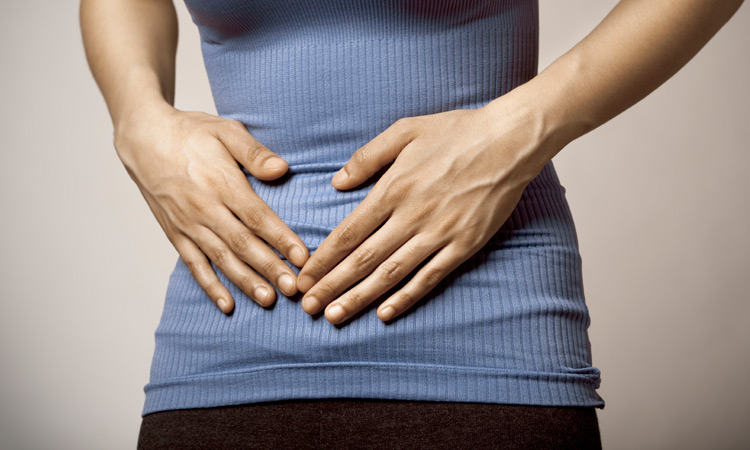If you’re experiencing less-than-perfect health or the feeling that something just isn’t quite right, your belly could be to blame. Any imbalance in the good bacteria lining the stomach can wreak havoc on the entire body. Eating certain foods and/or dehydration may also trigger stress or problems within the digestive system.
It happened to me on a recent flight: One minute all was well and then, suddenly, I felt an unmistakable pit rising in my stomach and realized something was amiss deep within the gut. To learn more, I went to a few experts in the world of wellness to find ways to enhance and improve stomach health, aiding in digestion, and easing any discomfort.
“Your gut impacts many functions of the body, including metabolism, genetic expression, skin condition, immune health and body weight,” says Amy Keller, Director of Education and Training at Organic India. “There is a lot of compelling modern research calling your gut your second brain or the enteric nervous system—it stands to reason a healthy gut is a key factor to overall optimal health.”
Dr Susan Blum, founder and director of Blum Center for Health, concentrates much of her practice on this very concept. “The good bacteria are responsible for maintaining a healthy immune system, and for helping you digest and absorb food and nutrients,” says Blum. This type of bacteria helps you maintain a good barrier between the outside world (such as what you eat and bring in through your mouth) and your inside world (think: blood and immune system).
When this type of bacteria is off-kilter, the gut, in turn, reacts, potentially causing a multitude of health woes. Digestive symptoms (think: gas and bloating), allergies, asthma, fatigue from nutrient deficiencies, food allergies due to damaged barrier function, and even systemic inflammatory conditions (arthritis, autoimmune disease, pain and inflammation) are among the concerns of patients seen by Blum.
Before you start worrying, relax—there are preventative measures that can help. Blum advises taking supplements like probiotics and prebiotics. “Probiotics are the beneficial bacteria and prebiotics are the fertilizer to help them grow. Both are critical for repairing the intestinal lining.” She recommends a combination formula with many strains of lactobacilli and bifidobacteria instead of single-strain products.”
According to beauty nutritionist Paula Simpson, increasing the intake of friendly bacteria has added benefits: Managing conditions such as atopic dermatitis, psoriasis and acne. Pre- and probiotics may offer an alternative to traditional treatments due to their calming, antioxidant and anti-pathogenic effect within the body, adds a Simpson, who is also co-founder of Z Skin Systems, a nutri-cosmetic line,
Paying careful attention to diet is also a necessity. Common inflammatory problem foods are gluten, dairy, soy and corn. Blum notes that people should also watch sugar, white flour processed foods, unhealthy fats, and chemical additives.
Trigger foods, however, aren’t the same for everyone. For those with specific flora imbalances such as small intestinal bacterial overgrowth, a special diet called FODMAP, avoiding certain starchy foods, may relive their symptoms from eating carbohydrates. “If you have had your gall bladder out, you might have trouble digesting fats. And if you are taking lots of antacids or PPI’s, animal food (both the protein and fat) might stress your system because your digestive power is diminished,” says Blum.
On the doctor’s positive list are fermented and cultured foods, such as kimchi, sauerkraut and fresh pickles, because they contain enzymes that naturally help digest food along with probiotics. “All raw vegetables also contain digestive enzymes and eating sprouted veggies, which have dramatically increased amounts of enzymes, plus cultured yogurt and kefir,” notes Blum.
Eating a well-balanced, nutrient-dense diet is essential to developing and maintaining a healthy digestive tract and restoring the good bacteria. Simpson agrees with these food guidelines, adding “the digestive system can withstand a lot of stress, from foods you eat to emotional stresses, but can only do so for a certain amount of time.”
Simpson suggests fiber-rich foods such as fruit, vegetables and whole grains. Reduce the intake of processed foods that have little nutrition or fiber and often contain large amounts of saturated fats, salt and preservatives that can be harmful to the body. Eat good fats in moderation such as omega-3 and omega-6; cut back on saturated fats that can make the digestive system sluggish.
Don’t forget to drink up–but stick to water or soothing herbal teas, skipping excessive amounts of alcohol, which may inflame the stomach lining or esophagus.
Unfortunately, most people only become aware of our digestion when something feels out of balance. Simpson notes: “Over time, the negative effects will accumulate and create health problems in the long-term. Stress affects the nerves of the digestive system and can upset the intricate balance of digestion.”
Finally, for a quick fix, try herbal teas that are rich in antioxidants, which can help reduces stress, support a healthy immune system, and aid digestion.
Click here to find out about Rose’s thoughts on wellbeing and health



